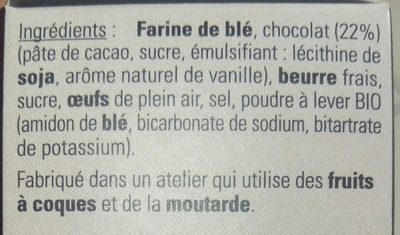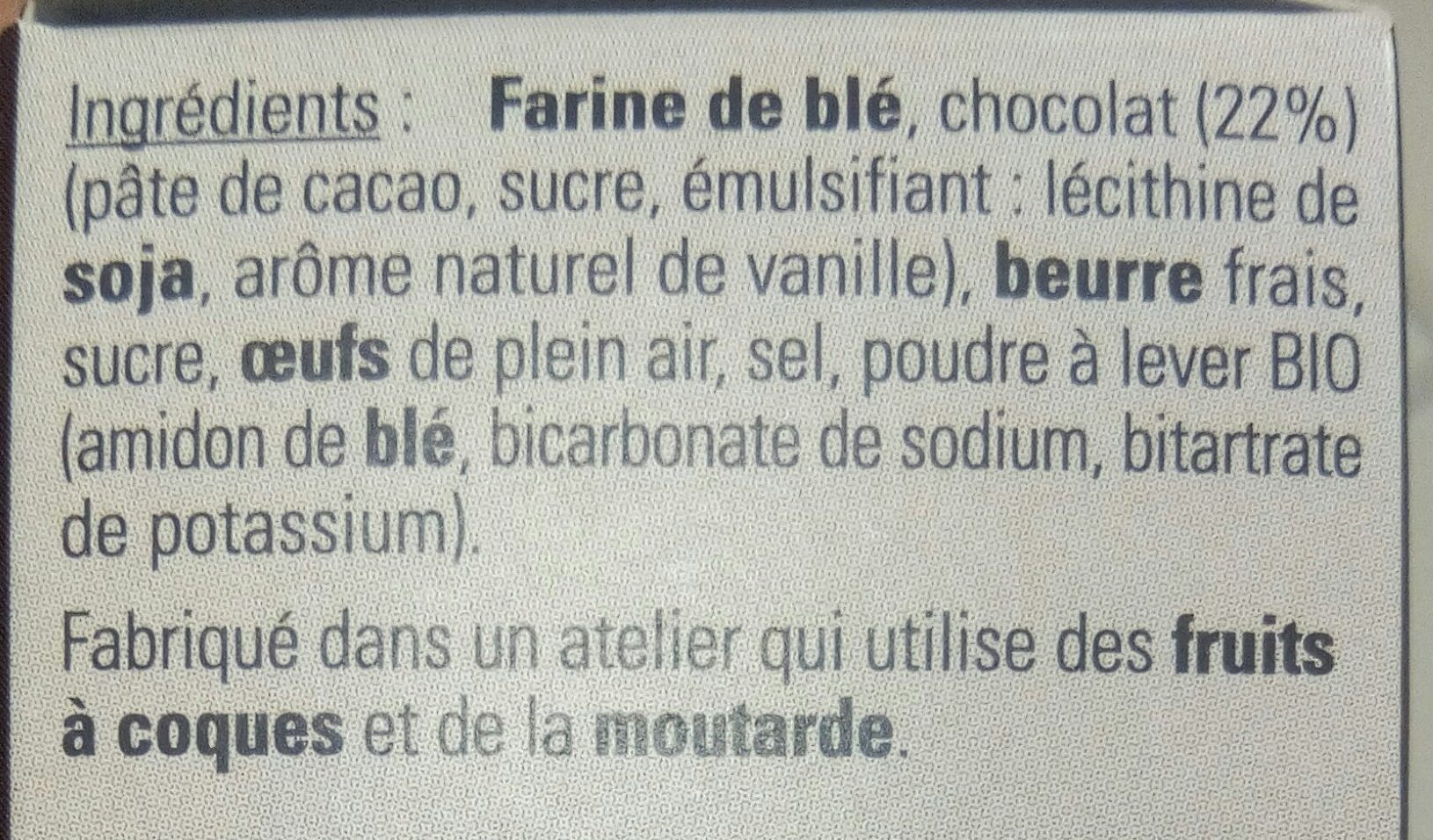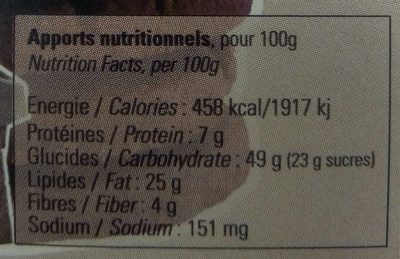Help us make food transparency the norm!
As a non-profit organization, we depend on your donations to continue informing consumers around the world about what they eat.
The food revolution starts with you!
Biscuits au Chocolat - Les Deux Gourmands - 44 g
Biscuits au Chocolat - Les Deux Gourmands - 44 g
This product page is not complete. You can help to complete it by editing it and adding more data from the photos we have, or by taking more photos using the app for Android or iPhone/iPad. Thank you!
×
Barcode: 3770003262374 (EAN / EAN-13)
Quantity: 44 g
Packaging: Plastic, Box, Cardboard
Brands: Les Deux Gourmands
Categories: Snacks, Sweet snacks, Biscuits and cakes, Biscuits, Chocolate biscuits
Labels, certifications, awards:
Green Dot, Tidy man
Manufacturing or processing places: France
Traceability code: FR 78.189.001 CE - Crespières (Yvelines, France)
Stores: Monoprix
Countries where sold: France
Matching with your preferences
Health
Ingredients
-
14 ingredients
: Farine de blé, chocolat (22 %) (pâte de cacao, sucre, émulsifiant: lécithine de soja, arôme naturel de vanille), beurre frais sucre, œufs de plein air, sel, poudre à lever bio (amidon de blé, bicarbonate de sodium, bitartrate de potassium).Allergens: Eggs, Gluten, Milk, SoybeansTraces: Mustard, Nuts
Food processing
-
Ultra processed foods
Elements that indicate the product is in the 4 - Ultra processed food and drink products group:
- Additive: E322 - Lecithins
- Ingredient: Emulsifier
- Ingredient: Flavouring
Food products are classified into 4 groups according to their degree of processing:
- Unprocessed or minimally processed foods
- Processed culinary ingredients
- Processed foods
- Ultra processed foods
The determination of the group is based on the category of the product and on the ingredients it contains.
Additives
-
E322 - Lecithins
Lecithins are natural compounds commonly used in the food industry as emulsifiers and stabilizers.
Extracted from sources like soybeans and eggs, lecithins consist of phospholipids that enhance the mixing of oil and water, ensuring smooth textures in various products like chocolates, dressings, and baked goods.
They do not present any known health risks.
-
E322i - Lecithin
Lecithins are natural compounds commonly used in the food industry as emulsifiers and stabilizers.
Extracted from sources like soybeans and eggs, lecithins consist of phospholipids that enhance the mixing of oil and water, ensuring smooth textures in various products like chocolates, dressings, and baked goods.
They do not present any known health risks.
-
E336 - Potassium tartrates
Potassium tartrate: Potassium tartrate, dipotassium tartrate or argol has formula K2C4H4O6. It is the potassium salt of tartaric acid. It is often confused with potassium bitartrate, also known as cream of tartar. As a food additive, it shares the E number E336 with potassium bitartrate.Source: Wikipedia
-
E336i - Monopotassium tartrate
Potassium tartrate: Potassium tartrate, dipotassium tartrate or argol has formula K2C4H4O6. It is the potassium salt of tartaric acid. It is often confused with potassium bitartrate, also known as cream of tartar. As a food additive, it shares the E number E336 with potassium bitartrate.Source: Wikipedia
-
E500 - Sodium carbonates
Sodium carbonates (E500) are compounds commonly used in food preparation as leavening agents, helping baked goods rise by releasing carbon dioxide when they interact with acids.
Often found in baking soda, they regulate the pH of food, preventing it from becoming too acidic or too alkaline. In the culinary world, sodium carbonates can also enhance the texture and structure of foods, such as noodles, by modifying the gluten network.
Generally recognized as safe, sodium carbonates are non-toxic when consumed in typical amounts found in food.
-
E500ii - Sodium hydrogen carbonate
Sodium hydrogen carbonate, also known as E500ii, is a food additive commonly used as a leavening agent.
When added to recipes, it releases carbon dioxide gas upon exposure to heat or acids, causing dough to rise and resulting in a light, fluffy texture in baked goods.
It is generally recognized as safe (GRAS) by regulatory authorities when used in appropriate quantities and poses no significant health risks when consumed in typical food applications.
Ingredients analysis
-
Palm oil free
No ingredients containing palm oil detected
-
Non-vegan
Non-vegan ingredients: Fresh butter, Free range eggs
-
Vegetarian
No non-vegetarian ingredients detected
-
Details of the analysis of the ingredients
: Farine de _blé_, chocolat 22% (pâte de cacao, sucre, émulsifiant (lécithine de _soja_), arôme naturel de vanille), _beurre_ frais, _œufs_ de plein air, sel, poudre à lever (amidon de _blé_, bicarbonate de sodium, bitartrate de potassium)- Farine de _blé_ -> en:wheat-flour - vegan: yes - vegetarian: yes - ciqual_proxy_food_code: 9410 - percent_min: 33.698 - percent_max: 78
- chocolat -> en:chocolate - vegan: maybe - vegetarian: yes - percent_min: 22 - percent: 22 - percent_max: 22
- pâte de cacao -> en:cocoa-paste - vegan: yes - vegetarian: yes - ciqual_proxy_food_code: 16030 - percent_min: 5.5 - percent_max: 22
- sucre -> en:sugar - vegan: yes - vegetarian: yes - ciqual_proxy_food_code: 31016 - percent_min: 0 - percent_max: 11
- émulsifiant -> en:emulsifier - percent_min: 0 - percent_max: 7.33333333333333
- lécithine de _soja_ -> en:soya-lecithin - vegan: yes - vegetarian: yes - ciqual_food_code: 42200 - percent_min: 0 - percent_max: 7.33333333333333
- arôme naturel de vanille -> en:natural-vanilla-flavouring - vegan: yes - vegetarian: yes - percent_min: 0 - percent_max: 5.5
- _beurre_ frais -> en:fresh-butter - vegan: no - vegetarian: yes - ciqual_proxy_food_code: 16400 - percent_min: 0 - percent_max: 22
- _œufs_ de plein air -> en:free-range-eggs - vegan: no - vegetarian: yes - ciqual_food_code: 22000 - percent_min: 0 - percent_max: 22
- sel -> en:salt - vegan: yes - vegetarian: yes - ciqual_food_code: 11058 - percent_min: 0 - percent_max: 0.151
- poudre à lever -> en:raising-agent - labels: en:organic - percent_min: 0 - percent_max: 0.151
- amidon de _blé_ -> en:wheat-starch - vegan: yes - vegetarian: yes - ciqual_proxy_food_code: 9510 - percent_min: 0 - percent_max: 0.151
- bicarbonate de sodium -> en:e500ii - vegan: yes - vegetarian: yes - percent_min: 0 - percent_max: 0.151
- bitartrate de potassium -> en:e336i - vegan: yes - vegetarian: yes - percent_min: 0 - percent_max: 0.0503333333333333
Nutrition
-
Missing data to compute the Nutri-Score
Missing nutrition facts
⚠ ️The nutrition facts of the product must be specified in order to compute the Nutri-Score.Could you add the information needed to compute the Nutri-Score? Add nutrition facts
-
Nutrient levels
-
Fat in high quantity (25%)
What you need to know- A high consumption of fat, especially saturated fats, can raise cholesterol, which increases the risk of heart diseases.
Recommendation: Limit the consumption of fat and saturated fat- Choose products with lower fat and saturated fat content.
-
Sugars in high quantity (23%)
What you need to know- A high consumption of sugar can cause weight gain and tooth decay. It also augments the risk of type 2 diabetes and cardio-vascular diseases.
Recommendation: Limit the consumption of sugar and sugary drinks- Sugary drinks (such as sodas, fruit beverages, and fruit juices and nectars) should be limited as much as possible (no more than 1 glass a day).
- Choose products with lower sugar content and reduce the consumption of products with added sugars.
-
Salt in low quantity (0.151%)
What you need to know- A high consumption of salt (or sodium) can cause raised blood pressure, which can increase the risk of heart disease and stroke.
- Many people who have high blood pressure do not know it, as there are often no symptoms.
- Most people consume too much salt (on average 9 to 12 grams per day), around twice the recommended maximum level of intake.
Recommendation: Limit the consumption of salt and salted food- Reduce the quantity of salt used when cooking, and don't salt again at the table.
- Limit the consumption of salty snacks and choose products with lower salt content.
-
-
Nutrition facts
Nutrition facts As sold
for 100 g / 100 mlAs sold
per serving (Un biscuit 11 g)Compared to: Chocolate biscuits Energy 1,917 kj
(458 kcal)211 kj
(50 kcal)-6% Fat 25 g 2.75 g +6% Saturated fat ? ? Carbohydrates 49 g 5.39 g -21% Sugars 23 g 2.53 g -29% Fiber 4 g 0.44 g +18% Proteins 7 g 0.77 g +9% Salt 0.151 g 0.017 g -72% Fruits‚ vegetables‚ nuts and rapeseed‚ walnut and olive oils (estimate from ingredients list analysis) 0 % 0 %
Environment
-
Eco-Score C - Moderate environmental impact
⚠ ️Select a country in order to include the full impact of transportation.The Eco-Score is an experimental score that summarizes the environmental impacts of food products.→ The Eco-Score was initially developped for France and it is being extended to other European countries. The Eco-Score formula is subject to change as it is regularly improved to make it more precise and better suited to each country.Life cycle analysis
-
Average impact of products of the same category: C (Score: 56/100)
Category: Biscuit (cookie), with chocolate, prepacked
Category: Biscuit (cookie), with chocolate, prepacked
- PEF environmental score: 0.47 (the lower the score, the lower the impact)
- including impact on climate change: 5.92 kg CO2 eq/kg of product
Stage Impact Agriculture
63.6 %Processing
29.8 %Packaging
2.3 %Transportation
3.2 %Distribution
1.0 %Consumption
0.0 %
Bonuses and maluses
-
Missing origins of ingredients information
Malus: -5
⚠ ️ The origins of the ingredients of this product are not indicated.
If they are indicated on the packaging, you can modify the product sheet and add them.
If you are the manufacturer of this product, you can send us the information with our free platform for producers.
-
Packaging with a medium impact
Malus: -11
Shape Material Recycling Impact Box Plastic High Unknown Cardboard Low ⚠ ️ The information about the packaging of this product is not sufficiently precise (exact shapes and materials of all components of the packaging).⚠ ️ For a more precise calculation of the Eco-Score, you can modify the product page and add them.
If you are the manufacturer of this product, you can send us the information with our free platform for producers.
Eco-Score for this product
-
Impact for this product: C (Score: 40/100)
Product: Biscuits au Chocolat - Les Deux Gourmands - 44 g
Life cycle analysis score: 56
Sum of bonuses and maluses: -16
Final score: 40/100
-
Carbon footprint
-
Equal to driving 3.1 km in a petrol car
592 g CO² per 100g of product
The carbon emission figure comes from ADEME's Agribalyse database, for the category: Biscuit (cookie), with chocolate, prepacked (Source: ADEME Agribalyse Database)
Stage Impact Agriculture
52.9 %Processing
42.0 %Packaging
1.9 %Transportation
2.9 %Distribution
0.3 %Consumption
0.0 %
Packaging
-
Packaging with a medium impact
-
Packaging parts
Box (Plastic)
(Cardboard)
-
Packaging materials
Material % Packaging weight Packaging weight per 100 g of product Paper or cardboard Plastic Total
-
Transportation
-
Origins of ingredients
Missing origins of ingredients information
⚠ ️ The origins of the ingredients of this product are not indicated.
If they are indicated on the packaging, you can modify the product sheet and add them.
If you are the manufacturer of this product, you can send us the information with our free platform for producers.Add the origins of ingredients for this product Add the origins of ingredients for this product
Report a problem
-
Incomplete or incorrect information?
Category, labels, ingredients, allergens, nutritional information, photos etc.
If the information does not match the information on the packaging, please complete or correct it. Open Food Facts is a collaborative database, and every contribution is useful for all.
Data sources
Product added on by moon-rabbit
Last edit of product page on by packbot.
Product page also edited by beniben.










